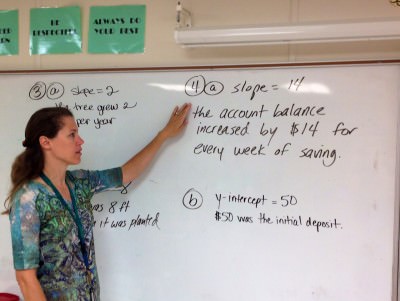At the 2014 Teaching & Learning conference, U.S. Secretary of Education Arne Duncan announced a new collaboration with the National Board for Professional Educator Standards on a Teach to Lead initiative aimed at helping schools and their districts to develop and grow teacher leadership opportunities throughout our nation’s schools. Throughout this past year, this program has hosted Teach to Lead summits and Learning Labs aimed at providing various education stakeholders in a dialogue around teacher leadership and resources from critical friends on developing ideas for their home districts. Last month this initiative convened seven state teams for a States Teach to Lead Summit where groups worked through multiple learning sessions and discussion groups on answering the question:
What does teacher leadership look like in your state?
For the North Carolina team, this questions came in two parts:
What is teacher leadership, and why is it important?
Teacher leadership in North Carolina
“Teacher leadership means having a voice in the policies and decisions that affect your students, your daily work, and the shape of your profession.” – Secretary Duncan


The second a teacher steps out of their classroom role as a facilitator of student learning and takes action to solve a problem, they are a teacher leader. However the current N.C. opportunities available (especially for increased compensation) are considered “extra duties.” The current “teacher leader” is one who goes into administration or becomes a guidance counselor—they must leave the classroom. Those who remain in the classroom that take on these extra responsibilities are typically the ones who raise their hands first when asked “Who would be interested in…” This model does not engage the true teacher leader. A hospital does not ask surgeon to leave the O.R. to run a department. Why should education be any different?
The educators for these types of roles should be identified for content expertise and success in professional instructional strategies, and then asked to lead in their school communities. For a teacher leadership model of an educator career pathway to be successful, all stakeholders in the teaching profession must come together and develop a common definition, in our state and individual districts, of what teacher leadership is to them, and how we plan to utilize it to increase student outcomes.
This leadership can come in many forms. Existing models have a hybrid teaching position; this is where classroom educators spend 60-80 percent facilitating students’ learning with the remaining 40-20 percent released time in their day working on teacher leadership responsibilities. One role has educators developing targeted professional developments for their specific department/school’s needs, which are discovered in a variety of co-teaching and mentoring situations. The other (with less released time) works with their professional learning team on developing innovative instructional practices and activities, which they implement in an open-classroom, clinical or learning lab type of environment for other teachers to participate in. Each role provides a specific level of compensation, comparable to the hours puts in to the job. This is what sets these models apart from N.C.’s current “teacher leadership” roles, providing this pathway as a way to climb the professional ladder while staying in the classroom.
Why is teacher leadership important in North Carolina?


The current political landscape in North Carolina has many educators feeling policies affecting education are done to them, and they have no voice in the matter. At the local and building level, many teachers feel burdened juggling student learning outcomes inside their classroom with the mountain of extra responsibilities outside the direct tasks of teaching; whether those duties be district testing requirements, formal running record keeping on student performance/recommendations, or data-collecting for their own professional evaluations, most teachers haven’t the time or energy to speak their opinion.
Couple this with the rising necessity for differentiated instruction in a constantly changing student audience, the need (and desire) for targeted professional developments, and planning opportunities to effectively collaborate with colleagues, the teaching profession has evolved to be extremely more complex than the traditional “chalk and talk” style many of us adults were accustomed to. Giving teachers something other than out-of-the-classroom roles to strive for in their career acknowledges their job as the profession it is, giving them more directed support and greater voice on the changes in education.
How can North Carolina districts develop effective teacher leadership models?
Though HB 662 (The Elevating Educators Act) seems to most as a differentiated pay structure for N.C. teachers, its potential is far greater than this fixed view of teacher compensation. This legislation, if passed, would grant funding for ten N.C. districts to essentially pilot teacher leadership models (which it refers to as “advanced teaching roles”). This is the opportunity for a means to focus on teacher leadership as a vehicle for increased student outcomes.
Though the N.C. team primarily dealt with the DPI perspective in the creation and implementation of teacher leadership models in our state, the future success of these models come from district-created programs centered on student learning. If students require differentiated instruction to maximize their learning, don’t individual districts need the same approach? HB 662 gives districts this latitude; however, the districts will need to understand the what and how questions behind teacher leadership before attempting to develop their own models.
The number one goal of everyone involved in the progression of North Carolina education is to increase student outcomes. The only way this can be achieved is by raising teaching quality throughout our state on every level possible (state, district, school). These teacher leadership roles, if done effectively and centered on student learning, rather than simply raising the teaching profession for the sake of it, have the immense potential to alter the way school is done in North Carolina.



